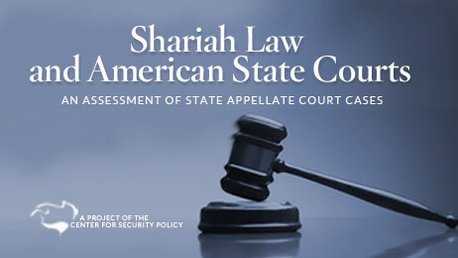Shariah Law and American State Courts: An Assessment of State Appellate Court Cases
This study evaluates published appellate legal cases that involved “conflict of law” issues between Shariah (Islamic law) and American state law.

Methodology
This study is based on research and analysis conducted in 2010 and 2011 by the Center for Security Policy and the offices of the Center’s general counsel, attorney David Yerushalmi. Initial identification of potential cases was done by counsel, CSP staff and interns, and citizen volunteers from the non-profit organization ACT for America. Information regarding state cases reported upon here was retrieved through Google Scholar using search terms including “Islam,” “Islamic” “Muslim,” “Sharia” and “Shariah.” Additional search terms were countryspecific: “Iran,” “Pakistan,” “Egypt” and “Saudi Arabia,” all countries with Shariah-centric legal systems.
The sample we reviewed was only “the tip of the iceberg,” because Google Scholar is not a complete database of state cases involving Shariah. As a search tool it only allows retrieval of those reported appellate and trial court level cases that are available through open sources (See “Future Directions,” below). We found an initial sample of approximately 150 cases involving Shariah doctrine, which were narrowed to a set of 50 cases designated Relevant or Highly Relevant.
Ratings
Of the 50 cases considered, 29 were rated “Highly Relevant,” meaning that upon legal review they were found to involve Shariah in a conflict of law with the Constitutional principles or state public policy at the trial court or appellate court level. The remaining 21 cases were rated “Relevant,” meaning that a significant element of Shariah law was involved at the trial court or appellate court level.
In addition, we evaluated whether the Trial Court (TC) and Appellate Court (AC) decisions were Shariah-compliant (SY), not Shariah-compliant (SN), indeterminate (SI) or not applicable (SNA). For example, a decision deemed to be Shariah-compliant at the trial courtlevel was labeled “TCSY,” while a decision deemed non-Shariah-compliant at the appellate level was labeled “ACSN.”
Findings
This study analyzes and discusses a total of 50 cases from 23 different states: 6 cases were found in New Jersey; 5 in California; 4 each in Florida, Massachusetts and Washington; 3 each in Maryland, Texas and Virginia; 2 each in Iowa, Louisiana and Nebraska; and 1 each in Arizona, Arkansas, Delaware, Illinois, Indiana, Maine, Michigan, Minnesota, Missouri, New Hampshire, Ohio and South Carolina.
The 50 cases were classified into seven distinct “Categories” of dispute: 21 cases deal with “Shariah Marriage Law”; 17 cases involve “Child Custody”; 5 deal with “Shariah Contract Law”; 3 deal with general “Shariah Doctrine”; 2 are concerned with “Shariah Property Law”; 1 deals with “Due Process/Equal Protection” and 1 deals with the combined “Shariah Marriage Law/Child Custody.”
In addition, the cases were also assessed as to whether or not the ultimate decision of the court was in accordance with Shariah law at both the Trial Court and Appellate Court levels:
At the Trial Court level: 22 decisions found that the application of Shariah was at odds with the state’s public policy; 15 found Shariah to be applicable in the case at bar; 9 were indeterminate; and in 4 cases Shariah was not applicable to the decision at this level, but was applicable at the appellate level.
At the Appellate Court level: 23 decisions found that the application of Shariah was at odds with the state’s public policy; 12 found Shariah to be applicable in the case at bar; 8 were indeterminate; and in 7 cases Shariah was not applicable to the decision, but had been applicable at the trial court level.
Across the 50 cases there were 16 foreign countries from which Shariah-based legal conventions or decisions were brought to bear upon the case. Some cases made reference to more than one country while others involved Shariah law without reference to a specific foreign country. Among the cases that referenced Shariah law in a foreign country: 6 each were from Saudi Arabia, Iran and Lebanon; 4 were from Egypt; 3 each were from Pakistan, Jordan and Morocco; 2 each were from India and Iraq; and 1 each was from Afghanistan, Algeria, Gaza [sic], Israel, the Philippines, Syria, and the United Arab Emirates (UAE).
One Arizona case, number 7 in the Top 20 summarized below (Nationwide Resources Corp. v. Massabni, Massabni, and Zouheil, 143 Ariz. 460, 694 P.2d 290 (Ct. App. 1984)), was unique in having multiple conflicts of law. At the Trial Court level, the judge arbitrarily applied the foreign Islamic law of Morocco, even though the parties were neither Moroccan nor Muslims; at the Appellate Court level, the judge applied the foreign law of Syrian Christians (the parties’ actual background), which still created a conflict with the public policies of Arizona.
- Military Starship: How SpaceX Is About to Make America Globally Dominant - March 4, 2025
- The Cautionary Tale of Zheng He - December 4, 2024
- Frank Gaffney departs CSP after 36 years - September 27, 2024
